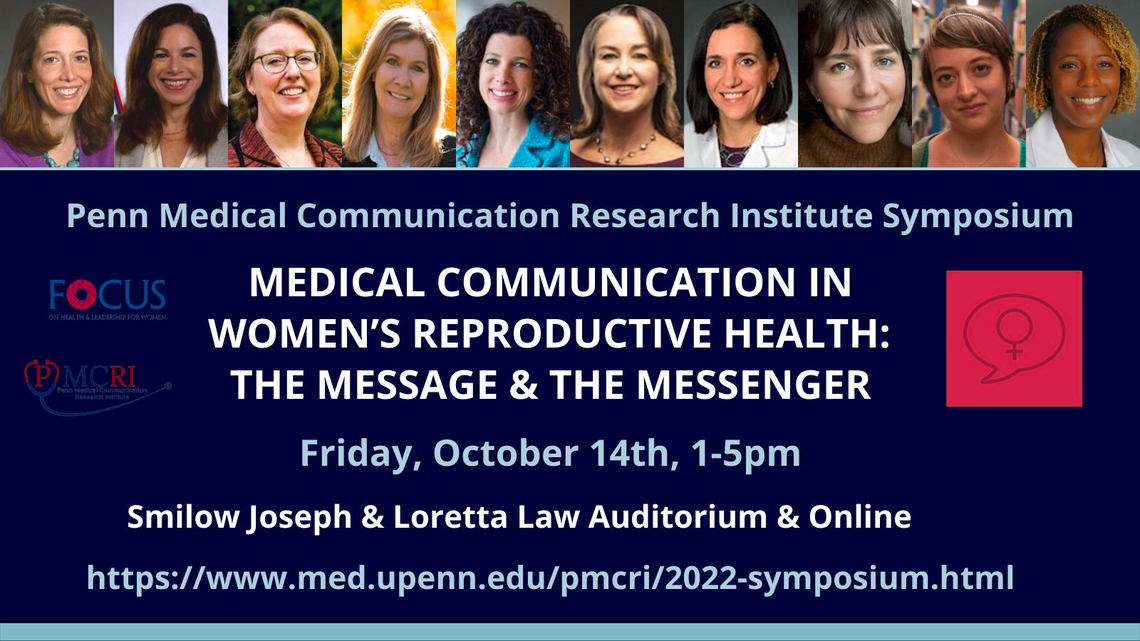2nd Annual Penn Medical Communication Research Institute Symposium

Medical Communication in Women’s Reproductive Health: The Message and the Messenger
Program:
Introductions
1:00 PM
Anne R. Cappola, MD, ScM
Director, Penn Medical Communication Research Institute, Professor of Medicine, Perelman School of Medicine
Courtney Schreiber, MD, MPH
Stuart and Emily B.H. Mudd Professor of Human Behavior and Reproduction in Obstetrics and Gynecology, Chief of the Division of Family Planning, Executive Director of FOCUS on Health and Leadership for Women, Perelman School of Medicine
Session 1: Special Considerations in Medical Communication in Women’s Reproductive Health
1:10 PM
Lisa Harris, MD, PhD
F. Wallace and Janet Jeffries Collegiate Professor of Reproductive Health, and Professor in the Department of Obstetrics and Gynecology and the Department of Women's and Gender Studies, University of Michigan
Communicating about abortion: The evidence that doctors' voices matter
Jessa Lingel, PhD
Associate Professor, Annenberg School for Communication, University of Pennsylvania
Information at the margins: Privacy concerns and personal health information
Betsy Rymes, PhD
Professor and Chair, Educational Linguistics Division, Graduate School of Education, University of Pennsylvania
Pregnant people, pregnant pauses: Words and reproductive health
Danielle Cosme, PhD
Research Director, Communication Neuroscience Lab, Annenberg School for Communication, University of Pennsylvania
What motivates people to share content?
3:00 PM BREAK
Session 2: Reproductive Health: Crafting Messages to Reach Desired Audiences
3:15 PM
Ellen Peters, PhD, MS
Philip H. Knight Chair, Director of the Center for Science Communication Research, Professor of Journalism and Communication and the Psychology, University of Oregon
Numeracy and facilitating decisions with data
Chioma Ndubisi, MD, MSc
Assistant Professor of Clinical Obstetrics and Gynecology, Perelman School of Medicine, University of Pennsylvania
Body language and bias in contraception counseling
Sarah Banet-Weiser, PhD
Distinguished Professor, Annenberg School for Communication, University of Pennsylvania, Director, Center for Collaborative Communication at the Annenberg Schools
Reproducing women: A brief history of media representations
Clarisa R Gracia, MD, MSCE
Nancy and Richard Wolfson Professor of Obstetrics and Gynecology, Chief, Division of Reproductive Endocrinology and Infertility, Perelman School of Medicine, University of Pennsylvania
Reproduction and fertility in the 21st century
Concluding Remarks and Next Steps
4:55 PM
Anne R. Cappola, MD, ScM
Director, Penn Medical Communication Research Institute, Professor of Medicine, Perelman School of Medicine
Read more about the speakers below.
Sponsored by:

Anne R. Cappola, MD, ScM
Director, PMCRI and Professor of Medicine, Division of Endocrinology, Diabetes, and Metabolism, Perelman School of Medicine, University of Pennsylvania
Anne R. Cappola, MD, ScM, is a Professor of Medicine in the Division of Endocrinology, Diabetes, and Metabolism and Director of the Penn Medical Communication Research Institute. Dr. Cappola directs an NIH-funded research program focused on the hormonal alterations that occur with aging and the clinical impact of these changes. Dr. Cappola is an elected member of the American Society for Clinical Investigation, the Association of American Physicians, and the Interurban Clinical Club and an Associate Editor for JAMA. She has received the Abbott Thyroid Research Mentor Award from the Endocrine Society, the American Thyroid Association’s Van Meter Award, and the American Statistical Association Outstanding Statistical Application Award. She is a graduate of Harvard College, the University of Pennsylvania School of Medicine, and the Johns Hopkins Bloomberg School of Public Health.
Courtney A. Schreiber MD, MPH
Stuart and Emily B.H. Mudd Professor of Human Behavior and Reproduction and Chief of the Division of Family Planning, Department of Obstetrics and Gynecology, University of Pennsylvania
Courtney A. Schreiber MD, MPH, is the Stuart and Emily B.H. Mudd Professor of Human Behavior and Reproduction in the Department of Obstetrics and Gynecology and Chief of the Division of Family Planning. Her research focuses on overcoming barriers to reproductive health care and access and closing sex and race disparity gaps. Dr. Schreiber is the Founding Director of PEACE, the Pregnancy Early Access Center at Penn Medicine, which is a national model for the integration of family planning and early pregnancy care. She serves as Program Director of the Fellowship in Complex Family Planning at Penn and as Executive Director of the Perelman School of Medicine’s FOCUS on Health and Leadership for Women (FOCUS).
Ellen Peters, PhD, MS
Philip H. Knight Chair and Director, Center for Science Communication Research, and Professor, School of Journalism and Communication and Department of Psychology, University of Oregon
Ellen Peters, PhD, MS, is an academic expert in decision making and the science of science communication. Her primary research interests concern how people judge and decide, and how evidence-based communication can boost comprehension and improve decisions in health, financial, and environmental contexts. She is especially interested in the basic building blocks of human judgment and decision making—such as emotions and number abilities—and their links to effective communication techniques. These processes are also central to the effects of adult aging on decision making as well as to public policy issues, such as how to communicate about the health effects of smoking or about the pros and cons of cancer screenings and treatments. She is also interested in methods to increase number ability, also know as numeracy, to improve decision making and, in turn, health and financial outcomes. As Philip H. Knight Chair, Director of the Center for Science Communication Research (SCR), and Professor in both the School of Journalism and Communication and the Psychology Department at the University of Oregon, she explores how policymakers, physicians, and other experts can enhance public understanding of science and technology by advancing the science of science communication. Her book, Innumeracy in the Wild: Misunderstanding and Misusing Numbers, was published by Oxford University Press.
Lisa Harris, MD, PhD
F. Wallace and Janet Jeffries Collegiate Professor of Reproductive Health, and Professor, Department of Obstetrics and Gynecology and Department of Women's and Gender Studies, University of Michigan
Lisa Harris, MD, PhD, is the F. Wallace and Janet Jeffries Collegiate Professor of Reproductive Health, and Professor in the Department of Obstetrics and Gynecology and the Department of Women's and Gender Studies at the University of Michigan. She is Associate Chair for Faculty Development and Faculty Life in Ob-Gyn and directs the University of Michigan's Fellowship in Family Planning. After college and medical school at Harvard University, she completed her residency in Obstetrics and Gynecology at the University of California, San Francisco. Because so many issues in reproductive health have to do as much with culture and politics as with biomedical sciences, she went on to earn a PhD in American Culture at the University of Michigan. She is now an active clinician, teacher, and researcher. Her clinical work includes most aspects of general obstetrics and gynecology care, with a focus on miscarriage and family planning. She teaches across disciplines at the University of Michigan and has co-taught Women’s and Gender Studies 400 (Women’s Reproductive Health) for the past 15 years. In addition to undergraduate teaching, she teaches in the Medical School, Law School, and School of Public Health. Her research is similarly interdisciplinary, focusing on medical history and sociology. In particular, her work explores abortion stigma, the experiences of abortion care providers, race and social class stratification of reproduction, strategies for providing healthcare within a reproductive justice framework, and the role of healthcare provider voices in reducing social polarization on contested issues. She is the recipient of a variety of awards for her research and advocacy, including the Association of Reproductive Health Professional's "Preserving Core Values in Science Award,” and the Outstanding Researcher Award from the Society of Family Planning.
Betsy Rymes, PhD
Professor and Chair, Educational Linguistics Division, and Director of the Master’s Program in Intercultural Commmunication, Graduate School of Education, University of Pennsylvania
Betsy Rymes, PhD, is Professor and Chair, Educational Linguistics Division, and Director of the Master’s Program in Intercultural Commmunication in the Graduate School of Education, University of Pennsylvania. She studies how language, social interaction, institutions, and the Internet influence what students learn in schools and how people get work done together. Dr. Rymes is the author of several books, including, Conversational Borderlands: Language and Identity in an Alternative Urban High School (Teachers College Press, 2001); Classroom Discourse Analysis: A Tool for Critical Reflection (Routledge, 2015); How We Talk About Language: Exploring Citizen Sociolinguistics; (Cambridge, 2021); and Studying Language in Interaction: A Practical Guide to Communicative Repertoire and Sociolinguistic Diversity (Routledge, in press). Dr. Rymes’ university teaching focuses on integrating discourse analysis and concepts from linguistic anthropology with a study of the conditions of multilingualism in school contexts and beyond.
Sarah Banet-Weiser, PhD
Distinguished Professor, Annenberg School for Communication, University of Pennsylvania and Professor of Communication, Annenberg School for Communication and Journalism, University of Southern California
Sarah Banet-Weiser, PhD, is Distinguished Professor at the University of Pennsylvania’s Annenberg School for Communication and Professor of Communication at the University of Southern California’s Annenberg School for Communication and Journalism. She is the founding director of the Center for Collaborative Communication at the Annenberg Schools (CCAS). Her teaching and research interests include gender in the media, identity, citizenship, and cultural politics, consumer culture and popular media, race and the media, and intersectional feminism. Committed to intellectual and activist conversations that explore how global media politics are exercised, expressed, and perpetuated in different cultural contexts, she has authored or edited eight books, including the award-winning AuthenticTM: The Politics of Ambivalence in a Brand Culture (NYU Press, 2012) and Empowered: Popular Feminism and Popular Misogyny (Duke, 2018), and dozens of peer-reviewed articles, book chapters, and essays. In 2019-2020, she had a regular column on popular feminism in the Los Angeles Review of Books. She has just completed a co-authored book (with Kathryn Claire Higgins), Believability: Sexual Violence, Media and the Politics of Doubt (Polity Press, forthcoming 2023).
Clarisa R Gracia, MD, MSCE
Nancy and Richard Wolfson Professor of Obstetrics and Gynecology and Clinical Investigator, Center for Research on Reproduction and Women’s Health, Perelman School of Medicine, University of Pennsylvania
Clarisa Gracia, MD, MSCE is a Professor of Obstetrics and Gynecology and the Chief of the Division of Reproductive Endocrinology and Infertility at the University of Pennsylvania. Dr. Gracia is medical director of Penn Fertility Care and was the previous director of third party reproduction and fertility preservation. She cares for patients with a broad range of reproductive concerns including infertility. She has over 160 publications in the field of reproduction and has been actively involved in several national and international organizations. She currently serves as a member of the American Board of Obstetrics and Gynecology REI Division and is Chair of the American Society of Reproductive Medicine Practice Committee. Dr. Gracia has received several awards including The Emily Hartshorne Mudd Award, given for significant contributions to the field of family health, and the Ira and Ester Rosenwaks New Investigator Award.
Danielle Cosme, PhD, MS
Research Director, Communication Neuroscience Lab, Annenberg School for Communication, University of Pennsylvania
Danielle Cosme, PhD, is the Research Director of the Communication Neuroscience Lab at the Annenberg School for Communication. Broadly, her research focuses on understanding social, cognitive, and motivational factors that promote goal pursuit and behavior change. The overarching goal of her research is to use neuroscience to design and evaluate translational interventions that facilitate behavior change and improve health and well-being during adolescence and adulthood. She received her
B.S. from Chapman University, her M.S. from Stockholm University (Sweden), and her Ph.D. in Psychology from the University of Oregon.
Jessa Lingel, PhD
Associate Professor, Annenberg School for Communication, University of Pennsylvania
Jessa Lingel, PhD, is an Associate Professor at the Annenberg School for Communication and core faculty in Gender, Sexuality and Women's Studies at the University of Pennsylvania. She studies digital culture, looking for the ways that relationships to technology can show us gaps in power or possibilities for social change. Dr. Lingel’s research focuses on three key areas: alterity and appropriation, and investigations of how information and technology is altered, tinkered with, subverted, and articulated by marginalized groups; politics of infrastructure, where systems of categorization, organization, and design can reveal underlying ideologies and logics; and technological activism as a way of exploring how socio-technical practices can contribute to projects of social justice. In her activist work, Dr. Lingel concentrates on prison abolition, libraries as vehicles for DIY education, and local access to mental health resources.
Chioma Ndubisi, MD, MSc, FACOG
Assistant Professor of Clinical Obstetrics and Gynecology, University of Pennsylvania
Chioma Ndubisi, MD, MSc, FACOG, is an Assistant Professor of Clinical Obstetrics and Gynecology and is a board-certified OB/GYN specializing in sexual and reproductive health at the University of Pennsylvania. She worked for four years as an OB/GYN generalist at a Federally Qualified Health Center in Washington, DC where she had the unique opportunity to care for some of DC's most complex patients. Dr. Ndubisi attended Indiana University for undergraduate studies and earned a BS in biology before completing medical school, with a distinction in community service, at the University of Rochester School of Medicine and Dentistry. In 2018, she completed a two-year fellowship in Complex Family Planning at Columbia University Medical Center while earning a Master of Science in Epidemiology concurrently at Columbia’s Mailman School of Public Health.



